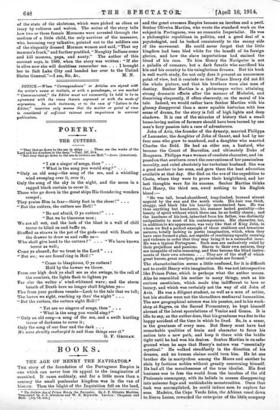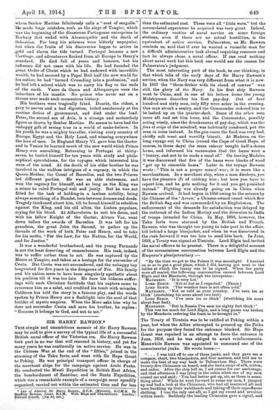BOOKS.
THE AGE OF HENRY THE NAVIGATOR./ THE story of the foundation of the Portuguese Empire is -one which can never lose its appeal to the imagination of mankind. It came suddenly, and for a little more than a century the small peninsular kingdom was in the van of bistory. Then the blight of the Inquisition fell on the land,
• The Gold" Age of Prince Henry the Narigator. By J. P. Oliveira Martine. Translated by J. J. Abraham and W. E. Reynolds. Loudon Chapman and Hall. tics. Cd. net.]
and the great overseas Empire became an incubus and a periL Senhor Oliveira Martins, who wrote the standard work on the subject in Portuguese, was no romantic Imperialist. He was a philosophic republican in politics, and a good deal of a psychologist, and he looked consistently to the seamy side of the movement. He could never forget that the little kingdom bad been bled white for• the benefit of its foreign glories, and how the slave importations had stained the blood of his race. To him Henry the Navigator is not a paladin of romance, but a dark fanatic who sacrificed his kin and his country to his vainglorious dreams. But his book is well worth study, for not only does it present an uncommon point of view, but it reminds us that Prince Henry did not fill the whole picture, and that his brothers were also men of destiny. Senhor Martins is a picturesque writer, attaining strong dramatic effects after the manner of Michelet, and theorizing eloquently, if often obscurely, on the moral of his tale. Indeed, we would rather have Senhor Martins with his gloomy disapproval than a more equable historian with less sense of drama, for the story is full of high lights and deep shadows. It is one of the miracles of history that a small home-loving nation of farmers should have been turned by one man's fiery passion into a race of adventurers.
John of Aviz, the founder of the dynasty, married Philippa of Lancaster, the daughter of John of Gaunt, and had by het• four• sons who grew to manhood, and a daughter who married Charles the Bold. He had an elder son, a bastard, who became the Count of Barcellos, and ultimately Duke of Brag,anza. Philippa was a woman of resolute character, and i m posed on that southern court the conventions of her passionless morality, and ruled absolutely her turbulent husband. She was a good mother to her sons, and gave them the best education available at that day. She died on the eve of the expedition to Ceuta, where they were to prove their knighthood, and her last thoughts were for its success. Seuhor Martins thinks that Henry, the third son, owed nothing to his English blood :—
" He was tall, broad-shouldered, long-limbed, bronzed almost negroid by the sun and the south winds. His hair was thick, shaggy, and black like his heavily moustached face. He was thus anything but handsome, his manner lacked geniality—the beauty of spirit without which there can be no bodily charm ; and the hardness of his look, inherited from his father, was distinctly antipathetic to most of his contemporaries. His character, too, in addition to iris appearance, was very like that of King John, in whom we find a perfect example of those stubborn and tenacious natures, totally lacking in poetic imagination, which, when they have once formed a plan, are capable of combining equally cunning and violence in order that they may bring it to a successful issue. He was a typical Portuguese. Such men are exclusively ruled by their prejudices and passions. Slaves to their own natures, they are incapable of calm reasoning, and thus become the blind instru- ments of their own schemes.. . . They are of the stuff of which great heroes, great martyrs, great criminals are formed."
The characterization seems a little confused, for it is difficult not to credit Henry with imagination. He was not introspective like Prince Peter, which is perhaps what the author means. Also he resembled his mother in many things, such as his curious asceticism, which made him indifferent to love or luxury, and which was certainly not the way of old John of Ariz. He was to diligent student, as well as a man of action, but his studies were not the threadbare mediaeval humanities. The new geographical science was his passion, and in his work- shop at Sagres, on the Sacred Promontory, he kept himself abreast of the latest speculations of Venice and Genoa. It is idle to say, as the author does, that his greatness was due to the happy accident of the time in which he lived. So, in a sense, is the greatness of every man. But Henry must have had remarkable qualities of brain and character to force his nation into a new path, and keep it there with the bridle tight until he had won his desires. Senhor• Martins is on safer ground when he says that Henry's nature was "essentially mystical." He walked steadfastly in the direction of his dreams, and no human claims could turn him. He let one brother die in martyrdom among the Moors and another be slain by factious nobles without greatly concerning himself. He had all the mercilessness of the true idealist. His first business was to free the world from the incubus of the old Ptolemaic cosmogony, with its beliefs in oceans disappearing into noisome fogs and unthinkable monstrosities. Once that task was accomplished, ho could induce men to explore far seas. Madeira, the Cape Verde Isles, the African coast down to-Sierra Leone, rewarded the enterprise of the little company whom Senhor Martins felicitously calls a " nest of seagulls." 1Ie made huge mistakes, such as the siege of Tangier, which was the beginning of the disastrous Portuguese enterprises in Marbary that ended with Alcacerquibir and the death of Sebastian. For long his schemes were bitterly unpopular, but when the fruits of his discoveries began to arrive in ,gold and slaves, the tide turned. Portugal became a new Carthage, and adventurers flocked from all Europe to Henry's atandard. He died full of years and honours, but his influence did not cease with his life. He had founded the 'great Order of Christ which he had endowed with incredible wealth, he had secured by a Papal Ball half the new world for Lis nation, he had "turned Crusading into a profession," and le had left a school which was to carry his flag to the ends of the earth. Vasco da Gatna and Albuquerque were the inheritors of his mantle. No prince who never sat on a throne ever made such momentous history.
. His brothers were tragically fated. Duarte, the eldest, a prey to nerves and a bad digestion, toiled assiduously at the routine duties of government, and died under the load. Peter, the second son of Ariz, is a strange and melancholy figure as drawn by Senhor Martins. He seems to have had the unhappy gift of seeing true in a world of make-believe. In his youth he was a mighty traveller, visiting every country of Europe, Egypt and the Holy Land, and winning everywhere the love of men. In England Henry VI. gave him the Garter. and in Venice he learned much of the new world which Prince Henry was assaulting. Returning to Portugal at thirty- seven, he busied himself for ten years with study and philo- sophical speculations, for the voyages which interested him were of the mind. At the death of his elder brother he was involved in the endless intrigues of a regency, in which the Queen7Mother, the Count of Barcellos, and the two Princes led different parties. He was an able statesman, and won the regency for himself, and so long as the King was a minor he ruled Portugal well and justly. But he was not fitted for the task of holding-in a lawless nobility, being always something of a Hamlet, torn between dreams and deeds. Tragedy thickened about him, till he found himself in rebellion against the King, and his old allies, the Lisbon populace, crying for his blood. At Alfarrobeira he met his doom, and with his fellow Knight of the Garter, Alvaro Vaz, went down before the swords of Barcellos. It was left for his grandson, the great John the Second, to gather up the threads of the work of both Peter and Henry, and to take for his motto, "For the Law, for the Nation, for the World, and for Justice."
It was a wonderful brotherhood, and the young Fernando is not the least deserving of remembrance. His task, indeed, was to suffer rather than to act. He was captured by the Moors at Tangier, and taken as a hostage for the surrender of Ceuta. But Ceuta was not surrendered, and the unhappy boy languished for fire years in the dungeons of Fez. His family and his nation seem to have been singidarly apathetic about his position till it was too late. He bore his hideous suffer- ings with such Christian fortitude that his captors came to reverence him as a saint, and credited his tomb with miracles. Calderon has told the story in a famous play, and the words spoken.by Prince Henry are a flashlight into the soul of that builder of mystic empires. When the Moor asks him why he does not surrender Ceuta and save his brother, he replies : "Because it belongs to God, and not to me."











































 Previous page
Previous page